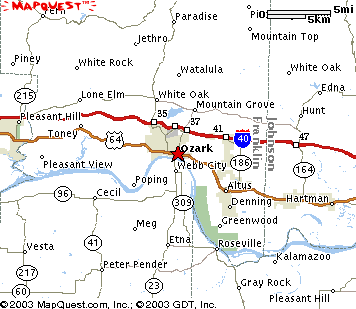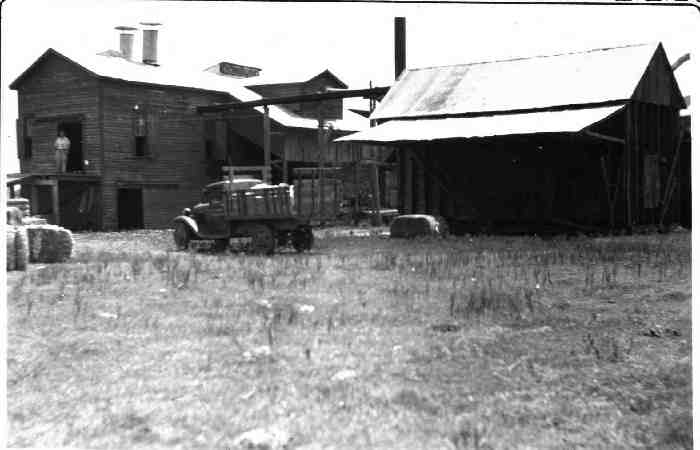
Charleston
Franklin County, Arkansas

From the Charleston, Arkansas Centennial Yearbook 1970:
Charleston, The largest town in South Franklin and one of the two county seats, was settled in 1843-44 by J. B. Thaxton, R.C. Thaxton and C.R. Kellum.
On April 8, 1874, Charleston was incorporated with D. Y. Sweeney as mayor. The town embraces a square mile (Township 7, Range 29).
By the time of the Civil War there were three merchandise stores, a combination gin and mill and several residences in the town.
In 1863, Federal scouts burned all of the buildings except two residences. The town was rebuilt as soon as possible after the Civil War.
NOTES and Photographs:
I thought you might be interested in these pictures taken of the Cotton Gin in Charleston, Arkansas. The information I have shows they were taken early 1920 .The house in the background belong to William Frinsemeier. Uncle Will and Aunt Tina (my Great Uncle by Marriage to Tina) I believe were owners but it could be that Uncle Will just managed it.
During the 1950's Will was the mayor of Charleston. Bill died around 1963 and Aunt Tina continued living there until she was unable to do so.
Then she was taken back to Carlisle, Arkansas, her childhood home to live . When she passed away she was returned to Charleston and buried in the cemetery out on the East edge of Charleston next to her husband.
I thought others in the area might enjoy seeing them and if you feel they are useable I would be honored.
Charlotte Brown
P.O.Box 367Russellville, Arkansas 72811Three Photographs:

With the completion of the railroad in 1898 Charleston boomed and had 650 people. In 1921 Charleston had a second period of building due to the coal mines in the neighborhood, and by 1920 had a population of 734.
The current census taken in 1970 shows a population of 1497. Charleston is primarily an agricultural community with numerous cattle and dairy farms although in the 1800's cotton was the chief crop and continued so until the early 1900's.
Some of the early settlers from 1834 to 1857 were J. B. and R. C. Thaxton, C. R. Kellum, E. M. Richardson, J. H. and J. E. Cotton, and J. Dunn and H. O. and M. W. Spencer.
After the war the first store was erected by Col. J.P. Falconer. Later Berry and Newton and W. A. Black and Co. In the seventies F. Younger, Baer and Joe, W. L Lelleam (gin and mill) Redden and Largely, millers; More and Hedges, blacksmiths.
In the eighties and nineties leading merchants were Falconer and Armistead, D. Y. Berry, L. Newton, V.V. Beavers and W. A. Milton; W. P. Richardson and F. D. Proctor were grocers, and drugs were handled by A. P. Richardson and D. L. Winters; R.D. Bridgman, hardware; furniture sold by J. D. Bolling. The Charleston House by D. R. Whitlock was the only inn. In wagon, carriage and blacksmith lines were J. L. Lanley, Moore and Daney, J. E. Smith and Moore and Hodgens.
Goodwin and Sons had a livery and stage stand; Richardson and Hedges were contractors; J. L. Landgley, lumber yard; Jack Price Barber, J. C. Berry and L. H. Gunter, painters; nursery owned by J. S. Burt. The medical profession was represented by Dr. E. B. Knotts, Dr. Wright, Dr. W. L. Kelleam, Dr. R.M. Southard, Dr. R.M. Barnes, Sr. Dr. George Kidwell and Dr. J. S. Burt.
The eye and ear Dr. J. M. Crandall's specialty; Dr. R. M. Barnes, Jr. a dentist. The attorneys in 1888 were J. D. Parks and T. A. Pettigrew. Later D. W. Bryan, A. N. Hill and F. J. Mott.
On June 18, 1881, the first Charleston newspaper came out.; The Vindicator was founded by the owners of the Ozark Democrat. Charles Knoble was the manager of the Vindicator and he purchased it a short time later. In 1883 , Dr. M. Stroup bought the Vindicator. He was followed by Bridgeman Brothers who became the owners in 1885. the Vindicator continued to serve the Charleston Community until 1898.
In 1900 the second and present newspaper was established, the Charleston Express owned and operated by P. Carter and Bert McCausey. Harry East was both the publisher and owner until the express was sold to John Guion in 1940.